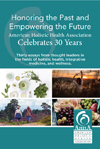American Holistic Health Association
The free, impartial wellness resource connecting you to the power of choice

Special Updates
Archives 2018
Free AHHA monthly Reports
The monthly Special Updates from the AHHA are Reports with items of interest to those actively enhancing their health and well-being. Each Report features a health or health freedom issue. It also features a research item and an AHHA resource.
These free Reports are sent out to subscribers.
You can have these AHHA Special Updates sent to you personally by signing up online.
The Archives of these AHHA Special Reports are maintained here for those who have not yet signed up to receive them by email and those who wish to review past issues.
December 14, 2018
FEATURED ISSUE
Artificial flavoring dangers
Environmental and health advocacy groups have been petitioning the courts to have the U.S. Food and Drug Administration (FDA) remove specific artificial flavorings from the food additives list. They cited research that these chemicals cause cancer in laboratory animals. As children are more sensitive to chemical exposure, it is not surprising that a group of pediatricians joined the effort last summer. Current U.S. regulations allow for the use of more than 10,000 additives to preserve, package, or modify the taste, appearance, texture, or nutrients in foods, including roughly 1,000 additives used under the Generally Recognized as Safe (GRAS) designation process that doesn’t require FDA approval.
In October, as a result of these advocacy efforts, in October the FDA de-listed seven synthetic flavoring substances from its food additives list. The removal of these additives is in accordance with the Delaney Clause of the Federal Food, Drug, and Cosmetic Act in which the FDA cannot approve the use of any food additive that has been found to induce cancer in animals at any dose. In its statement, however, the FDA noted that due to the low levels of exposure in foodstuffs, they have determined they do not presently pose a risk to public health. Nonetheless, these chemicals have been removed, and the FDA has granted companies a 24-month period to reformulate and come into compliance.
This controversy has also spotlighted regulations that support package labels listing “artificial flavors” rather than identifying the specific chemicals used to generate the flavors. The advocacy groups note there is more to be done, including legislation to fix regulations outside the jurisdiction of the FDA.
In the meantime, those concerned about these and other chemicals in food might consider the following physician recommendations to limit exposure:
-Buy and serve more fresh or frozen fruits and vegetables, and fewer processed foods
-Wash hands thoroughly before and after touching food
-Clean all fruits and vegetables that cannot be peeled
-Do not microwave food or beverages in plastic containers
-Use alternatives to plastic, such as glass or stainless steel, for cooking and storage.
ISSUE: Some artificial flavoring chemicals outlawed
AHHA strives to maintain a neutral position on issues and viewsknowledge as power. For those interested in learning more about this month’s issue, the following related articles were selected to serve as a foundation for becoming aware of this matter.
American Academy of Pediatrics Says Some Common Food Additives May Pose Health Risks to Children (7/23/18)
American Academy of Pediatrics
[Pediatricians state why important to no longer permit certain chemicals]
FDA Bans Seven Artificial Food Flavorings (10/5/18)
by Kathleen Doheny
WebMD
[Outlines why chemical bans were sought]
FDA Removes Clearance for 7 Synthetic Flavoring Substances (10/9/18)
The Daily Intake
[Outlines legal steps taken]
FDA Removes 7 Synthetic Flavoring Substances from Food Additives List (10/5/18)
U.S. Food & Drug Administration
[FDA position on why removed seven food additives, but maintains position actions not needed]
This Loophole Allows Chemicals to Hide In Your Food (11/29/18)
by Michael Sikora
Alliance for Natural Health USA
[Outlines food additives labeling issues]
We encourage you to go to our blog at https://ahha.org/blog and post your comments. You are invited to share additional resources you have found relating to this issue.
FEATURED AHHA RESOURCE
Holiday gifts can include health tips
Are you looking for a special holiday gift to motivate a loved one to get more involved in his/her quality of wellness? AHHA members have written books and created CDs and DVDs that are filled with tips for improving our health.You can learn more at Health-related Books, CDs, DVDs…and the Books/ Other Media section of the AHHA Organizational Member list.
November 16, 2018
FEATURED ISSUE
Organic fraud
An increasing number of shoppers are willing to purchase “organic” products at a higher cost to ensure that their foods are free of synthetic pesticides, antibiotics, hormones, and genetically-modified organisms. Unfortunately, there is evidence of fraud: some non-qualifying products have been falsely labeled as organic. This month’s Issue gives you an overview of what has been happening in 2018 to remedy this situation so that trust in the organic label can be restored. The U.S. Department of Agriculture’s (USDA) National Organic Program’s (NOP) three-pronged plan includes: (1) strong organic control systems, (2) farm-to-market traceability, and (3) robust enforcement. Outside the government, the Organic Trade Association (OTA) has kicked off their Global Organic Supply Chain Integrity (GOSCI) Task Force, a pilot program to deter organic fraud.
ISSUE: What is happening to restore trust in organic label?
AHHA strives to maintain a neutral position on issues and views knowledge as power. For those interested in learning more about this month’s issue, the following related articles were selected to serve as a foundation for becoming aware of this matter.
USDA outlines three-prong plan to detect and prevent fraud in organic (5/30/18)
by Elizabeth Crawford
Food Navigator-USA
[USDA NOP launched a comprehensive and aggressive three-prong approach to detect and prevent fraud in the organic industry]
What’s the National Organic Program Doing About Organic Fraud (8/30/18)
Organic Produce Network
[NOP now coordinating with Animal and Plant Health Inspection Service (APHIS)]
Compliance and Enforcement Updates: NOP Enforcement Activities (9/11/18)
US Department of Agriculture (USDA)
[Quarterly tallying of actual NOP activities]
Multi-Million Dollar Organic Fraud Scheme Uncovered In America’s Heartland…Here’s What You Need to Know (11/2/18)
by Nick Meyer
AltHealth Works
[Specific case of enforcement of organic fraud]
Pilot program kicks off to deter organic fraud (11/5/18)
Organic Trade Association
[OTA pilot project to prevent and detect fraud in the global organic system]
National Organic Program (NOP)
US Department of Agriculture (USDA)
[NOP standards for USDA organic seal]
Fraudulent Organic Certificates
US Department of Agriculture (USDA)
[How to report fraudulent USDA organic certificates]
We encourage you to go to our blog at https://ahha.org/blog and post your comments. You are invited to share additional resources you have found relating to this issue.
FEATURED AHHA RESOURCE
How do YOU define “holistic”?
Have you discovered that others are not defining the term “holistic” the same way you are? AHHA has always recommended that when you’re talking about holistic concepts, it’s wise to define terms and make sure you and the person you are talking to are on the same page. AHHA offers articles on this important topic. See the What is Holistic? category in our Self-Help Articles Collection. Perhaps these articles will also help you clarify your own thinking about what “holistic” really means.
October 12, 2018
FEATURED ISSUE
How supplements become drugs
Two years ago, AHHA performed an in-depth review of the U.S. Food and Drug Association (FDA)regulations for New Dietary Ingredients (NDI) and shared the referenced regulations in our September 2016 Issue. A concern raised at that time is still unresolved. If a drug company begins investigating a nutrient for use in a drug before a supplement company files an NDI notification on that nutrient, the drug company can ask the FDA to have supplement version removed from the market, leaving consumers with no other option than the drug.In 2016, we cited this question and answer from page 42 of the Dietary Supplements: New Dietary Ingredient Notifications and Related Issues: Guidance for Industry of this guide, we note:
May I use an ingredient in a dietary supplement if it has been clinically tested as a drug but has not been approved as a drug in the U.S.? The general rule is that an article that was authorized for investigation as a new drug or as a biologic before being marketed as a food or as a dietary supplement cannot be marketed as a dietary supplement if substantial clinical investigations of the article have begun and the existence of such investigations has been made public.
AHHA’s comment in 2016 was that this seemed to be an unusual item to include in this document. So we searched to learn whether this has ever happened. We found that theFDA had approved a drug company’s request for a form of natural vitamin B6 to be in a drug research trial(and B6 was thus banned from use in dietary supplements) because the FDA ruled it did not qualify for the pre-1994 DI exemption. “Even when an IND [Investigational New Drug] is rescinded, or when it does not lead to a new drug, the supplement form is still banned.”
Now, in 2018, there are indications that the natural supplements L-glutamine and CBD oil may become “drugs.”The FDA has progressed to the approval stage for two new drugs with active ingredients of these two natural supplements. Will these natural compounds remain available as supplements or will they become only available by prescription?
ISSUE: Do natural supplements need to be protected from FDA designated as drugs?
AHHA strives to maintain a neutral position on issues and viewsknowledge as power. For those interested in learning more about this month’s issue, the following related articles were selected to serve as a foundation for becoming aware of the two sides of this matter.
FDA notices:
FDA approved L-glutamine powder for the treatment of sickle cell disease (8/18/17)
U.S. Food & Drug Administration
FDA approves first drug comprised of an active ingredient derived from marijuana to treat rare, severe forms of epilepsy (6/25/18)
U.S. Food & Drug Administration
ANH concerns:
FDA Turned Your $10 Supplement into a $40,000 Drug (10/4/18)
Alliance for Natural Health USA
FDA Back Channel Lets Pharma Turn Nutrients Into Drugs (2/15/18)
Alliance for Natural Health USA
We encourage you to go to our blog at https://ahha.org/blog and post your comments. You are invited to share additional resources you have found relating to this issue.
To review past ISSUES, visit the Special Updates Archives.
FEATURED AHHA RESOURCE
Do you have any treatment questions?
Perhaps the most important resource ever created by AHHA is the Treatment Researchers list. This unique list includes organizations whose experts can research treatment options for any health condition. They also answer your health questions. You can specify conventional medicine and/or alternative approaches. If you know of someone dealing with a life threatening or debilitating diagnosis, it is vital for you to inform him or her of this valuable support option.
September 21, 2018
FEATURED ISSUE
Medicare insolvency estimates
Medicare is the federal health insurance program for people 65 years and over and for younger people with permanent disabilities. Have you ever wondered if there will be around if and when should you need it? Over the last few years, the financial status of Medicare ranged from stable to projections of insolvency. Each year, new projected insolvency dates are made based on numerous factors including payroll taxes, taxes on Social Security benefits, hospital spending, Medicare Advantage payments, population data, regulatory reform and much more. This year the general consensus of actuaries projects insolvency of the Hospital Insurance Trust Fund (which covers Part A of Medicare) by 2026. However, Medicare will not be bankrupt. Specifically, the projections are that when this trust fund is exhausted incoming payroll taxes and other revenue will cover 91% of benefits. These revenues will gradually decline to cover 78% of costs in 2042, and again gradually rise to 85% by 2092. Proposals have been made to account for the shortfall, either through raising revenues and/or slowing the growth in costs. While many economic factors can impact the date of insolvency either positively or negatively, we encourage you to be realistic in your financial planning for your future and to lead a healthy lifestyle to help reduce your need for expensive medical care.
ISSUE: What would you do if there were no Medicare?
AHHA strives to maintain a neutral position on issues and views knowledge as power. For those interested in learning more about this month’s issue, the following related articles were selected to serve as a foundation for learning more about this matter. If you need more statistics than those above pulled from the articles, read all of the articles carefully.
The Medicare Program Trustees Report & Trust Funds (6/5/18)
Centers for Medicare & Medicaid Services
The Facts on Medicare Spending and Financing (6/22/18)
by Juliette Cubanski and Tricia Neuman
Henry J Kaiser Family Foundation
Medicare trust fund to run out by 2026: 7 things to know (6/6/18)
by Emily Rappleye
Becker’s Hospital CFO Report
Medicare Is Not “Bankrupt” (7/3/18)
by Paul N. Van De Water
Center on Budget and Policy Priorities
Medicare, Social Security running out of money faster than expected (6/5/18)
by Nolan Hicks
New York Post
Imagining a World without Medicare (1/3/18)
by Ann Harrington and Douglas Clement
Federal Reserve Bank of Minneapolis
We encourage you to go to our blog at https://ahha.org/blog and post your comments. You are invited to share additional resources you have found relating to this issue.
FEATURED AHHA RESOURCE
Change a life
AHHA offers a single sheet that introduces the powerful concept of the “holistic approach.” It’s available for free! Check out our Gift for a Better Life flyer. Who do you know who could benefit from receiving a copy of this sheet? Download it, print it out double-sided, share it with a friend, and empower that friend’s life. Notice that this flyer is available in both English and Spanish.
August 10, 2018
FEATURED ISSUE
Sunscreen dangers
Have you noticed recent articles in the media on the safety and effectiveness of sunscreen products? The concerns voiced, including absorption of toxic ingredients and less effectiveness than claimed, are causing many to reconsider the type of sunscreen protection they will use this summer. For those of you who would like to do some research on your options, we have compiled a number of articles to provide you with the pros and cons being discussed. While it appears to be that the best products are not currently available in the U.S., the preferred approach for protection from the sun seems to be cover-up clothing and a sunscreen lotion or cream with topical zinc oxide or titanium dioxide that does not contain nanosized particles.
ISSUE: What will you decide to do about protection from the sun?
AHHA strives to maintain a neutral position on issues and viewsknowledge as power. For those interested in learning more about this month’s issue, the following related articles were selected to serve as a foundation for learning more about this matter.
Many Sunscreens Are Toxic and Only Half as Effective as Claimed (5/30/18)
Mercola
Study finds 67 percent of sunscreens don’t actually work – find one that does (5/23/18)
by Fiza Pirani
The Atlanta Journal-Constitution
The Environmental Working Group Released Its Sunscreen Guide for 2018 (5/22/18)
by Marci Robin
The Environmental Working Group
Sunscreens: How to Read a Label, Expert Tips etc.
Cosmetics Info
Does Europe Have Better Sunscreens?
Environmental Working Group
Your Outdated U.S. Sunscreen Exposes You to Needless Cancer Risk (5/25/18)
by Jack Kaskey
Bloomberg
We encourage you to go to our blog at https://ahha.org/blog and post your comments. You are invited to share additional resources you have found relating to this issue.
FEATURED AHHA RESOURCE
Discover new wellness options
AHHA Organizational Member companies offer you innovative wellness-enhancing products and services to support your journey to a higher level of wellness. In our online Resource section, check out the PRODUCTS and SERVICES categories of the AHHA Self-Help Tools searchable database.
July 13, 2018
FEATURED ISSUE
Dietary supplements drugs or food?
On June 21, 2018, the federal Office of Management and Budget (OMB) released its recommendationsfor reorganizing many functions of the federal government to improve efficiency, effectiveness and accountability. One recommendation was that food safety regulations would be removed from the responsibilities of the U.S. Food and Drug Administration (FDA) and all food regulations would be transferred to the U.S. Department of Agriculture (USDA).
Currently the FDA is responsible for protecting the public health by ensuring the safety, efficacy, and security of human and veterinary drugs, biological products, medical devices, the nation’s food supply, cosmetics, and products that emit radiation (per FDA website). The proposed change would rename the FDA as the Federal Drug Administration and continue its responsibilities for drugs, devices, biologics, tobacco, dietary supplements, and cosmetics. The USDA Food Safety and Inspection Service (FSIS) with its expanded responsibilities would become a single agency housed at the USDA and called the Federal Food Safety Agency.
This proposal to have the food safety functions of the FDA moved to the Department of Agriculture, and making only one agency responsible for ALL food regulations, appears to be a logical move for streamlining administrative processing. However, dietary supplements in the U.S., and in most world trade organizations, are designated as FOOD, not drugs. A concern raised by some is that leaving dietary supplements under the jurisdiction of the new Federal Drug Administration could result in dietary supplements eventually being designated and regulated as drugs. It is unclear if the decision to leave dietary supplements under the FDA jurisdiction was due to a lack of understanding of the industry or was deliberate. If you use dietary supplements, you may be motivated to keep your eye on this matter as the proposed government agency shuffle progresses.
ISSUE: Will dietary supplements be food or drugs – according to federal oversight designation?
AHHA strives to maintain a neutral position on issues and views knowledge as power. For those interested in learning more about this month’s issue, the following related articles were selected to serve as a foundation for learning more about this matter.
The Federal Food Safety Agency: A Proposal to Move FDA Food Safety Responsibilities to the USDA (7/5/18)
by A. Bryan Endres
FarmDocDaily
“In the context of food safety, OMB proposed merging FSIS and the food safety functions of FDA into a new agency housed within USDA called the Federal Food Safety Agency. The FDA would be renamed the Federal Drug Administration and would continue to regulate drugs, devices, biologics, tobacco, dietary supplements, and cosmetics.”
White House proposes a narrowing of FDA’s mission — and a new name (6/21/18)
by Ike Swetlitz
STAT
“The idea of changing a key mission of the FDA comes amid a turf war between the FDA and the USDA.”
Trump administration proposes changes to HHS, FDA (6/24/18)
by Gergory Twachtman
Oncology Practice
“Food oversight functions would move from the Food and Drug Administration to the USDA;FDA would be rebranded the Federal Drug Administration and focus on drugs, devices,biologics, tobacco, dietary supplements, and cosmetics.”
Trump Administration Proposes Consolidating Federal Food Safety Responsibilities into Single Agency at USDA, Renaming FDA the “Federal Drug Administration” (6/21/18)
Saul Ewing Arnstein & Lehr
“Per the proposal, FDA would continue to regulate dietary supplements. Currently, FDA regulates supplements as foods – a fact that might be lost on some – although it regulates them differently than ‘conventional’ foods.”
We encourage you to go to our blog at https://ahha.org/blog and post your comments. You are invited to share additional resources you have found relating to this issue.
June 22, 2018
FEATURED ISSUE
Can antidepressants trigger violence?
The recent and tragic mass shootings at schools and other venues have reactivated the debate on a possible relationship between antidepressant medications and violent behavior, even by formerly passive individuals. One viewpoint is that there is strong evidence of a connection in cases of outward, violent behavior, another viewpoint looks at self-directed violent behavior, and a third is that there is no direct relationship. Readers who have a physician’s diagnosis of depression may want to research the side effects of prescription antidepressants. When reviewing research on the medications, be sure to look at details of the study, including the ages of the study’s participants and what side effects (if any) were reported in the study. You may also want to explore information on non-pharmacologicoptions for dealing with depression, such as psychotherapy and behavior changes (diet, exercise, sleep, socializing). As always, be sure to review all treatment options you are considering with your physician.
ISSUE: Will medication be my first option for dealing with depression?
AHHA strives to maintain a neutral position on issues and viewsknowledge as power. For those interested in learning more about this month’s issue, the following related articles were selected to serve as a foundation for learning more about this issue from both pro and con perspectives.
PRO
Do SSRI Antidepressants Cause Violence? (1/30/18)
by Marcia Purse
VeryWell Mind
The Safety, Tolerability and Risks Associated with the Use of Newer Generation Antidepressant Drugs: A Critical Review of the Literature. (8/11/16)
by AF Carvalho, MS Sharma, AR Brunoni, E Vieta, GA Fava
Psychotherapy and Psychosomatics
Comparative efficacy and acceptability of 21 antidepressant drugs for the acute treatment of adults with major depressive disorder: a systematic review and network meta-analysis (2/21/18)
by Andrea Cipriani, MD & others
The Lancet
CON
Expert Warns of Antidepressants Linked to Violence (5/29/18)
Citizens Commission on Human Rights International
Are Antidepressants to Blame for America’s Violence Epidemic? (5/25/18)
by Gretchen DuBeau
The Daily Caller
Madness, murder and antidepressant drugs (4/24/18)
by Karen Selick
Troy Media
We encourage you to go to our blog at https://ahha.org/blog and post your comments. You are invited to share additional resources you have found relating to this issue.
To review past ISSUES, visit the Special Updates Archives.
May 11, 2018
FEATURED ISSUE
Food supply contaminated?
A recent news story reveals that when FDA scientists brought food from their homes to test for pesticide contamination, most of the foods tested positive. This was in sharp contrast to the “official” FDA test samples that tested negative or at low/legally acceptable levels. Our issue this month is to alert you to be aware of the possible extent of contamination of our U.S. food supply, particularly of wheat, by the pesticide glyphosate (the key ingredient in the weed-killer Roundup). We found explanations of the how and why of the standard practice of spraying glyphosate on wheat to make harvesting easier. While you might think that a low level of pesticide contamination would not be a problem, cumulative exposure is suspected to increase the prevalence of a number of health conditions like gastrointestinal disorders, autism, and certain cancers.
ISSUE: Is our food supply contaminated by glyphosate in pesticides?
AHHA strives to maintain a neutral position on issues and viewsknowledge as power. For those interested in learning more about this month’s issue, the following related articles were selected to serve as a foundation for learning more about this issue.
[How glyphosate can get into the foods you eat]
Why Is Glyphosate Sprayed on Crops Right Before Harvest? (3/5/18)
by Ken Roseboro
EcoWatch
The Real Reason Wheat is Toxic (it’s not the gluten) (3/4/18)
The Healthy Home Economist
[FDA scientists tested food from their own homes and found glyphosate.]
Weedkiller found in granola and crackers, internal FDA emails show (4/30/18)
by Carey Gillam
The Guardian
Emails Show FDA Chemists Have Been Quietly Finding Glyphosate in Food (5/1/18)
by Dan Nosowitz
Modern Farmer
[Actual email from FDA scientist to colleagues]
Email from FDA scientist Richard L. Thompson (1/4/17)
[FDA reports on testing for glyphosate]
FDA FOIA Documents Regarding Glyphosate Residue Testing (5/2/18)
by Carey Gillam
U.S. Right to Know
You may be thinking “Didn’t AHHA have the Issue of the Month related to glyphosate recently?” Yes, the March 2018 Issue of the Month was “Do I want to reduce my exposure to Roundup?” However, this month’s new information seemed too important not to alert you in a timely manner.
We encourage you to go to our blog at https://ahha.org/blog and post your comments. You are invited to share additional resources you have found relating to this issue.
FEATURED AHHA RESOURCE
Healthcare career?
More and more people are contacting AHHA for information about a health care career that includes the holistic health approach. In response to these queries, AHHA has compiled a special section of our website, Career Research, with considerations and resources to support those researching their career options. You can share this resource with those friends who may be contemplating a career change to healthcare.
April 13, 2018
FEATURED ISSUE
FDA–anti-homeopathy?
This alert is for those who prefer (or need) non-drug options for dealing with a health challenge. The future availability of homeopathic remedies in the United States appears to be threatened.
Homeopathy is a 200-year-old system of medicine based on the principle that highly diluted substances can be used to treat symptoms similar to symptoms that would be caused by large doses of those same substances in healthy people. Homeopathy works because the “substance” becomes so diluted that only the energy of it is left. For this reason, homeopathy has been viewed for centuries as one of the safest treatment options available.
With the U.S. Food and Drug Administration’s (FDA) new Draft Guidance, Drug Products Labeled as Homeopathic: Guidance for FDA Staff and Industry (released in December of 2017), the FDA’s enforcement policy is changing entirely and the 1988 CPG Sec. 400.400 Conditions Under Which Homeopathic Drugs May be Marketed is being rescinded. The deadline for submitting comments to the FDA has been extended to May 21, 2018. If this change goes into effect, the reality is that requiring non-patentable homeopathic remedies to meet pharmaceutical drug testing requirements will be too expensive for costs to ever be recovered, so it would be expected that most homeopathic products will not qualify to be available for sale.
There are two dramatically opposing positions about the credibility and safety of homeopathy. AHHA’s review of the history, articles, and research has revealed conflicting interpretations of this healing modality.
ISSUE: Should the FDA change the homeopathy Guidelines?
AHHA strives to maintain a neutral position on issues and views knowledge as power. For those interested in learning more about this month’s issue, the following related articles were selected to serve as a foundation for learning more about this issue.
PRO
FDA proposes new, risk-based enforcement priorities to protect consumers from potentially harmful, unproven homeopathic drugs (12/18/17)
U.S. Food & Drug Administration
FDA to step up enforcement of homeopathic medicine (1/11/18)
by Diane Romza-Kutz, Fredric Roth
Thompson Coburn, LLP
FDA to crack down on “harmful, unproven homeopathic drugs” (12/18/17)
by Rich Haridy
New Atlas
FDA takes on homeopathic drugs with potential safety risks (12/19/17)
by Michael Nedelman
CNN
My Christmas Wish Came Early: FDA Cracks Down on Homeopathy (12/22/17)
by Julianna LeMieux
AmericanCouncil on Science and Health
FDA takes more aggressive stance toward homeopathic drugs (12/18/17)
by Laurie McGinley
The Washington Post
Homeopathic products and practices: assessing the evidence and ensuring consistency in regulating medical claims in the EU (September 2017)
European Academies Science Advisory Council
CON
The Case FOR Homeopathic Medicine: The Historical and Scientific Evidence (updated 12/6/17)
by Dana Ullman, MPH, CCH
Homeopathic Family Medicine
What You Need to Know About the FDA’s War on Homeopathy (2/1/18)
Living Whole
Letter to FDA (2/8/18)
American Institute of Homeopathy
Critique of Proposed Regulations of Homeopathic Medicines and Alternative Proposals (3/6/18)
by Dana Ullman, MPH, CCH
Mercola
Patricide by the FDA on Homeopathy (3/19/18)
by Scott C. Tips
Whole Foods Magazine
Is the FDA Trying to Ban Over-The-Counter Homeopathy? (2/2/18)
by Larry Malerba, DO
GreenMedInfo
Comments by: National Health Freedom Action (NHFA) (3/8/18)
on Docket ID. FDA-2017-D-6580 – FDA DRAFT GUIDANCE Comments Drug Products Labeled as Homeopathic; Guidance for FDA Staff and Industry
American Institute of Homeopathy Accuses European Academies Science Advisory Council of Deliberate Scientific Bias (October 2017)
American Institute of Homeopathy
We encourage you to go to our blog at https://ahha.org/blog and post your comments. You are invited to share additional resources you have found relating to this issue.
FEATURED AHHA RESOURCE
Personal health tips
Our website lists many exciting products available to support your journey to a higher level of wellness. A number of AHHA members have written books and created CDs and DVDs that present personal health tips. You can check these out at Health-related Books, CDs, DVDs… and the Books/Other Media section of the Self-Help Tools list.
March 9, 2018
FEATURED ISSUE
No Roundup warnings
A recent California judicial ruling means there will be no cancer warnings on products containing glyphosate sold in California, even though glyphosate remains on the Proposition 65 list of carcinogenic chemicals that “require businesses to provide warnings to Californians about significant exposures to chemicals that cause cancer, birth defects or other reproductive harm.” Since the 2015 World Health Organization (WHO) monograph that classified glyphosate––a major ingredient in the pesticide Roundup––as ”probably carcinogenic to humans,” there has been much debate about the conflicting research. If you are a consumer with concerns about using a glyphosate pesticide product, consider becoming more informed than just reading the label. If you are concerned about eating food exposed to this ingredient, consider researching which foods, such as USDA certified organic foods, are free of this pesticide.
ISSUE: Do I want to reduce my exposure to Roundup?
AHHA strives to maintain a neutral position on issues and views knowledge as power. For those interested in learning more about this month’s issue, the following related articles were selected to serve as a foundation for researching this issue.
[WHO position that glyphosate might cause cancer]
IARC Monographs Volume 112: evaluation of five organophosphate insecticides and herbicides (3/20/15)
World Health Organization
[Various law suits related to glyphosate/Roundup]
The Monsanto Papers: MDL Glyphosate Cancer Case Key Documents & Analysis (2/28/18)
U.S. Right To Know
[Charges questioning Monsanto research]
Monsanto Manipulates Science to Make Roundup Appear Safe (4/5/17)
By Amanda Claire Starbuck
Food & Water Watch
[California takes adds Roundup to list of products that might cause cancer]
California says key ingredient in Roundup weed killer can cause cancer (6/29/17)
By Holly Yan
CNN
[Misc. positions on safety of glyphosate]
Does Glyphosate Cause Cancer? 8/28/17)
By Vanessa Schipani
FactCheck.org
[Agricultural groups sue against California position that Roundup might cause cancer]
California Prop 65, Glyphosate And Soybeans: What Farmers Need To Know (11/16/17)
By Aaron Pultze APR
Iowa Soybean Association
[Suit with claim that Roundup does cause cancer]
Lawsuit Against Monsanto Alleges Roundup Causes Cancer (1/5/18)
By Tamara Burns
Top Class Actions
[California judge leaves cancer caution on list, but blocks warning notice to consumers on products]
Glyphosate cancer warning in California halted (2/27/18)
by Geoffrey Mohan
LA Times
[Ideas for those interested in reducing their exposure to Roundup]
How to protect yourself against Monsanto’s cancer-causing Roundup [link no longer available]
The Hearty Soul
We encourage you to go to our blog at https://ahha.org/blog and post your comments. You are invited to share additional resources you have found relating to this issue.
FEATURED AHHA RESOURCE
How to find a progressive physician
Are you searching for a medical doctor who delivers care that is more than just drugs and surgery? Checking referral programs that list holistic associations is a good way to start. But if this does not help you locate such a physician in your geographic area, our Practitioner Referral Sources list is a useful next step. Our list includes a wide variety of organizations that give referrals, some of which are exclusively for medical doctors. Physicians who are affiliated with the organizations in our database are definitely the open-minded, progressive ones who have gone beyond drugs and surgery. Where else but with AHHA can you find so many of these special physicians so easily?
February 9, 2018
FEATURED ISSUE
Surviving the flu
The current flu season is deadly serious. How aware are you of preventive options that can help you avoid the flu? Are you aware of the best hygiene practices that will help you not pass it on to those around you?
We are all familiar with the basic recommendations: (1) get a flu shot, (2) wash your hands frequently, and (3) stay away from those who are sick. But these are obviously not enough. Because the effectiveness of this year’s vaccination has been reported to be between 10 and 30 percent, now would be a good time to focus on your lifestyle choices, which include getting more sleep, decreasing your stress, and eating a healthy diet. There is evidence for the effectiveness of supplementing these with natural remedies. You and your healthcare provider may consider preventive and symptomatic strategies that include taking vitamins, minerals, botanicals, and homeopathic remedies.
ISSUE: Which flu prevention and treatment options work?
AHHA strives to maintain a neutral position on issues and views knowledge as power. For those interested in learning more about this month’s issue, the following related articles were selected to serve as a foundation for researching this issue.
Flu Season From Hell Keeps Getting Worse (1/26/18)
by Michelle Cortez
Bloomberg
How bad this flu season really is—and what you should do about it (1/30/18)
by Sara Chodosh
Popular Science
Preparing Yourself for the Flu Season Naturally
by Catherine Clinton, ND
American Association of Naturopathic Physicians
12 Flu Natural Remedies (1/28/18)
Dr. Axe Food is Medicine
Pediatrician-Approved Natural Remedies for the Flu (11/20/17)
by Elisa Song, MD
Healthy Kids Happy Kids
Staying Healthy Through the Cold Flu Season with Natural Remedies (1/29/18)
Hybrid Rasta Mama
In height of flu season, alternative remedies sought for symptom relief (1/29/18)
by Meredith Stutz
WSAV.com On Your Side
We encourage you to go to our blog at https://ahha.org/blog and post your comments. You are invited to share additional resources you have found relating to this issue.
To review past ISSUES, visit the Special Updates Archives.
January 12, 2018
FEATURED ISSUE
Cholesterol not the culprit?
What is your personal health plan to prevent heart disease? Until recently, the best advice was to watch your cholesterol. High cholesterol is correlated with heart disease and stroke, leading causes of death in the U.S. But recent research highlights the importance of other risk factors that also contribute to heart disease, including hypertension, diabetes, and smoking. Luckily, these risk factors can be largely affected by a healthy lifestyle. While it makes sense to continue monitoring your cholesterol levels, other lab tests may provide key information about your risk for heart disease. You are encouraged to review the research documenting the relationships between inflammation or diabetes and heart disease. Whatever you choose for your personal health plan, be sure to include a healthy diet, exercise, and avoiding smoking.
ISSUE: Changing role of cholesterol among causes of heart disease
AHHA strives to maintain a neutral position on issues and views knowledge as power. For those interested in learning more about this month’s issue, the following related articles were selected to serve as a foundation for researching this matter.
PRO – treating for lowering levels of bad cholesterol to prevent heart disease
Cholesterol (11/13/17)
Centers for Disease Control and Prevention
Raising ‘good’ cholesterol fails to protect against heart disease (11/15/17)
University of Oxford
Should you take statins? Guidelines offer different answers (1/1/18)
by Michael Nedelman
CNN
Four Common Cholesterol Misconceptions (12/22/17)
by Timothy O’Shea, PharmD
Pharmacy Times
CON – against treating cholesterol levels as prevention of heart disease
Is it time to retire cholesterol tests? (12/6/17)
by Mitch Leslie
Science
What We Learn When Two Ruthless Killers, Heart Disease and Cancer, Reveal a Common Root (9/27/17)
by Siddhartha Mukherjee
The New York Times Magazine
Cardiovascular Disease & Diabetes (12/5/17)
American Heart Association
Cholesterol Isn’t the Problem in Heart Disease; Inflammation Is (9/13/17)
by Dr. Mercola
Mercola
We encourage you to go to our blog at https://ahha.org/blog and post your comments. You are invited to share additional resources you have found relating to this issue.
FEATURED AHHA RESOURCE
Your personal healthcare team
Whether your team is one individual or a diverse group of practitioners, the ideal healthcare team is one in which you and your physicians and other healthcare professionals function as partners and everyone espouses a holistic (whole person) approach to creating optimal wellness for you. If this isn’t happening in your case, consider making some changes. A great place to start your search is the AHHA Practitioner Member list.
Special Updates Archives for 2023
Special Updates Archives for 2022
Special Updates Archives for 2021
Special Updates Archives for 2020
Special Updates Archives for 2019
Special Updates Archives for 2018
Special Updates Archives for 2017




















